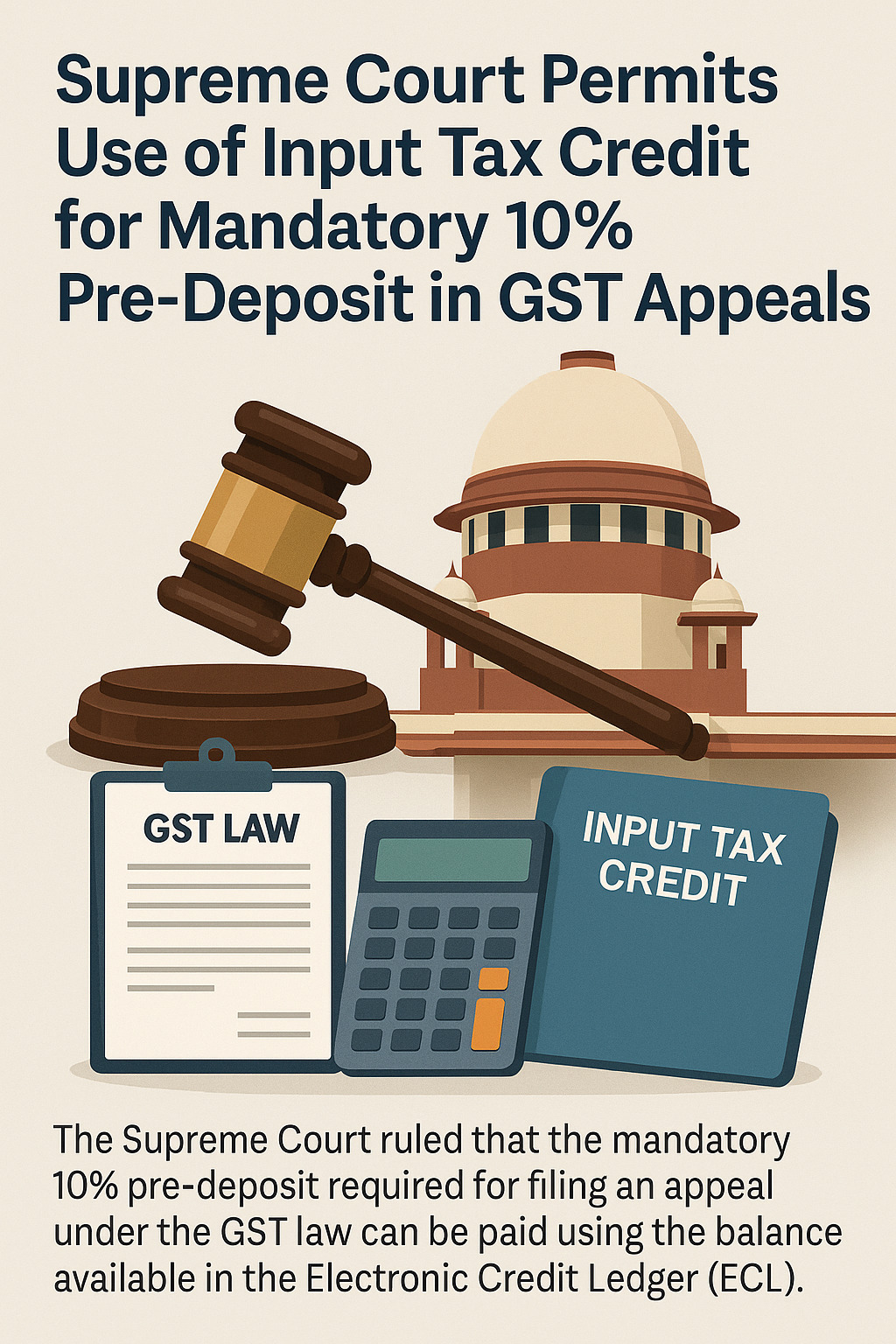View News
Supreme-Court-Permits-Use-of-Input-Tax-Credit-for-Mandatory-Pre-Deposit-in-GST-Appeals-A-Major-Relief-for-Businesses

Supreme Court Permits Use of Input Tax Credit for Mandatory 10% Pre-Deposit in GST Appeals: A Major Relief for Businesses
In a landmark judgment that brings significant relief to taxpayers across India, especially small and medium enterprises (SMEs), the Hon’ble Supreme Court has ruled that the mandatory 10% pre-deposit required for filing an appeal under the Goods and Services Tax (GST) regime can be discharged using the balance available in the Electronic Credit Ledger (ECL).
Background of the Case
The case originated when Yasho Industries, a registered taxpayer under the GST law, filed an appeal against a tax demand order. As per Section 107(6) of the CGST Act, 2017, a taxpayer is required to deposit 10% of the disputed tax amount as a mandatory pre-condition for filing an appeal before the Appellate Authority.
Yasho Industries discharged this pre-deposit liability by utilizing their available Input Tax Credit (ITC) through Form GST DRC-03. However, the tax department rejected this mode of payment, contending that such pre-deposits must be made in cash and not through the ITC available in the ECL.
The matter eventually reached the Supreme Court after the department challenged earlier favorable rulings in favor of the taxpayer. The Apex Court, in a decisive judgment, dismissed the government’s challenge and upheld the taxpayer’s right to use ITC for the pre-deposit.
Key Highlights of the Judgment
-
Validation of ITC for Pre-Deposit: The Court categorically stated that the law does not prohibit the utilization of ITC for making the mandatory 10% pre-deposit under Section 107(6).
-
Recognition of ITC as Tax Paid: The judgment reaffirmed the principle that ITC is a form of tax already paid on inputs, and denying its use is against the spirit of GST’s value-added tax system.
-
Legitimacy of Form GST DRC-03: The Court also noted that payment through Form DRC-03 using ITC is a valid method under the GST rules and cannot be arbitrarily rejected by the authorities.
Implications for Taxpayers
-
Reduced Cash Flow Burden
SMEs and other businesses often face cash flow constraints, especially during ongoing litigation. This ruling allows them to conserve working capital by using accumulated ITC for pre-deposits rather than making out-of-pocket payments. -
Fair and Efficient Appeal Process
By permitting ITC usage, the judgment promotes a more equitable appellate process, removing unnecessary financial barriers and ensuring that the right to appeal is not hindered due to liquidity issues. -
Clarity and Certainty
The Supreme Court’s clear interpretation will bring consistency and legal certainty across GST appellate forums, potentially reducing frivolous litigation by tax authorities.
Practical Steps for Taxpayers
-
Maintain Accurate ITC Records: Ensure that your Electronic Credit Ledger is updated and reconciled regularly to support ITC-based payments.
-
Use Form DRC-03 Appropriately: While filing an appeal, correctly file Form DRC-03 and indicate that the 10% pre-deposit is being made through ITC.
-
Document Communications: Keep records of all correspondence and filings in case of any disputes with the department.
Conclusion
This Supreme Court judgment is a welcome development in the GST landscape, reinforcing the core principle that GST is a value-added tax system where ITC should be seamlessly credited and utilized. It strikes a balance between revenue protection and taxpayer convenience, strengthening the trust-based tax regime envisaged under GST.
Businesses should take advantage of this ruling to manage their GST compliance more efficiently and mitigate litigation-related financial stress.
Stay tuned to our website for more updates and expert insights on GST and other tax matters.
Unlock the Potential of Legal Expertise with LegalMantra.net - Your Trusted Legal Consultancy Partner”
Disclaimer: Every effort has been made to avoid errors or omissions in this material in spite of this, errors may creep in. Any mistake, error or discrepancy noted may be brought to our notice which shall be taken care of in the next edition In no event the author shall be liable for any direct indirect, special or incidental damage resulting from or arising out of or in connection with the use of this information Many sources have been considered including Newspapers, Journals, Bare Acts, Case Materials , Charted Secretary, Research Papers etc.

